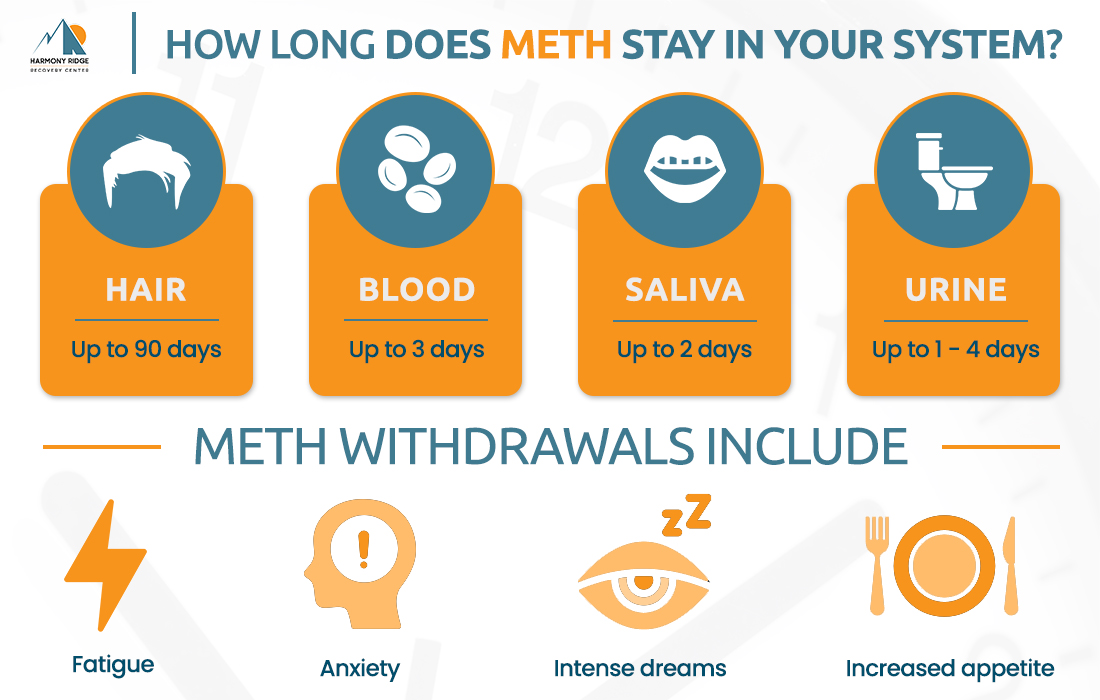In the labyrinth of addiction, methamphetamine carves a sinister pathway, leaving behind ruin and devastation. Its relentless grip on the body and mind can cripple lives, but there is hope for liberation. Detoxification, the arduous and crucial first step towards recovery, empowers individuals to break free from the clutches of this insidious substance. In this article, we will delve into the intricacies of methamphetamine detoxification, guiding you through each stage with compassionate expertise and practical advice.

Image: www.harmonyridgerecovery.com
Methamphetamine, also known as “meth” or “crystal meth,” is a highly addictive psychostimulant that floods the brain with dopamine, creating an intense euphoric rush. However, this fleeting pleasure comes at a profound cost. Prolonged meth use wreaks havoc on the central nervous system, cardiovascular health, and cognitive functions, leading to physical and psychological turmoil.
Recognizing the severity of your situation is paramount. If you or someone you love is struggling with meth addiction, seeking professional help is essential. Detoxification can be a challenging and potentially risky process, requiring medical supervision and a supportive environment.
The Withdrawal Process
Abruptly stopping meth use triggers an array of withdrawal symptoms that can range from mild discomfort to severe and life-threatening. These symptoms typically manifest within 24 hours of the last dose and can persist for several weeks. The most common withdrawal symptoms associated with meth include:
- Intense cravings
- Anxiety and irritability
- Depression and suicidal thoughts
- Fatigue and difficulty concentrating
- Tremors, sweating, and rapid heart rate
- Hallucinations and delusions
The severity of withdrawal symptoms can vary depending on several factors, such as the duration and intensity of meth use, individual tolerance levels, and overall physical and mental health.
Medical Detoxification
Due to the unpredictable and potentially severe nature of meth withdrawal, medical detoxification is strongly recommended. This supervised setting provides round-the-clock care and treatment to manage withdrawal symptoms and minimize health risks.
During medical detoxification, you will be closely monitored by healthcare professionals who will assess your physical and mental condition, administer medications as needed, and provide support and counseling. Medications commonly used to alleviate withdrawal symptoms include antidepressants, antipsychotics, and benzodiazepines.
The length of medical detoxification can vary depending on individual needs and the severity of withdrawal symptoms. Most programs typically last for 5 to 10 days, but some individuals may require a longer or more intensive treatment.
Post-Detoxification Care
Successful detoxification is merely the first step on the road to recovery. To sustain sobriety, it is crucial to continue with post-detoxification care, which may include:
- Inpatient or outpatient rehabilitation programs
- Medication-assisted treatment
- Individual and group therapy
- Sober living environments
- Support groups and peer support
These ongoing forms of care provide a structured and supportive environment to help you rebuild your life, address the underlying causes of addiction, and develop healthy coping mechanisms.
Emotional Support and Inspiration
Detoxification from methamphetamine is an emotionally demanding and physically challenging process. It is normal to experience fear, anxiety, and doubt along the way. However, remember that you are not alone, and there are people who care about you and want to help.
Connect with loved ones, support groups, or a therapy network to share your experiences, seek encouragement, and draw strength from others who understand your struggles. Refrain from isolating yourself and embrace the power of human connection.
Recognize that relapse is a possibility during the early stages of recovery. If you do experience a setback, view it as an opportunity for learning and growth rather than a failure. Seek professional help and support immediately, and do not give up on your journey towards sobriety.
Conclusion
Breaking free from methamphetamine addiction is an arduous but achievable endeavor. Detoxification is the pivotal first step, offering a beacon of hope in the darkness of addiction. By embracing professional guidance, medical care, and ongoing support, you can reclaim your life from the clutches of meth. Remember, you are not defined by your past struggles, and recovery is a testament to the resilience of the human spirit.

Image: theheightstreatment.com
How To Get Meth Outta Your System